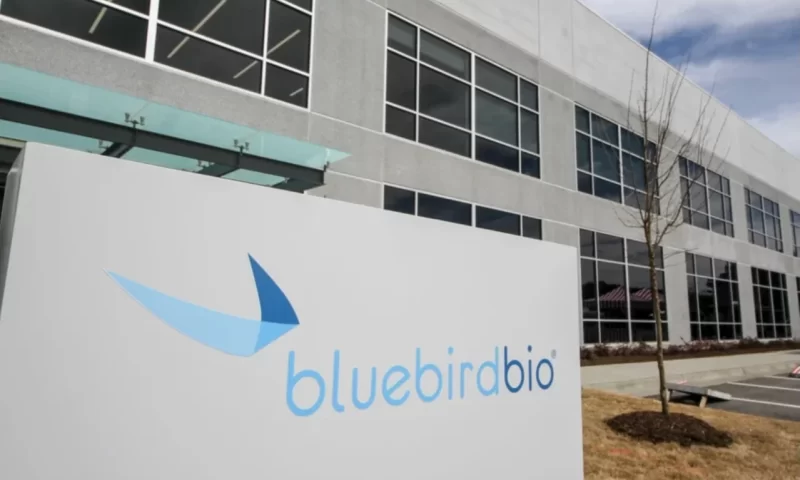bluebird bio, Inc. (NASDAQ:BLUE – Get Free Report) shot up 15.3% during mid-day trading on Monday . The company traded as high as $7.33 and last traded at $7.31. 510,899 shares changed hands during mid-day trading, an increase of 31% from the average session volume of 388,562 shares. The stock had previously closed at $6.34.
Analysts Set New Price Targets
BLUE has been the topic of several recent research reports. StockNews.com started coverage on bluebird bio in a report on Thursday. They issued a “sell” rating on the stock. Royal Bank of Canada reaffirmed a “sector perform” rating and set a $80.00 price target on shares of bluebird bio in a report on Friday, November 15th. Barclays lowered their target price on bluebird bio from $80.00 to $40.00 and set an “overweight” rating on the stock in a research report on Friday, November 15th. JPMorgan Chase & Co. downgraded shares of bluebird bio from a “neutral” rating to an “underweight” rating in a report on Friday, November 15th. Finally, Cantor Fitzgerald reiterated a “neutral” rating on shares of bluebird bio in a report on Monday, September 16th. Three equities research analysts have rated the stock with a sell rating, six have given a hold rating and two have assigned a buy rating to the stock. Based on data from MarketBeat.com, bluebird bio currently has an average rating of “Hold” and an average price target of $49.14.
bluebird bio Price Performance
The stock has a market capitalization of $1.52 billion, a PE ratio of -3.95 and a beta of 0.72. The company has a quick ratio of 0.33, a current ratio of 0.51 and a debt-to-equity ratio of 0.37. The stock’s 50-day moving average is $8.68 and its 200 day moving average is $13.96.
bluebird bio (NASDAQ:BLUE – Get Free Report) last announced its quarterly earnings results on Friday, September 13th. The biotechnology company reported ($7.20) EPS for the quarter. The firm had revenue of $18.57 million during the quarter. bluebird bio had a negative net margin of 565.74% and a negative return on equity of 322.46%. As a group, equities analysts predict that bluebird bio, Inc. will post -1.35 earnings per share for the current year.
Institutional Trading of bluebird bio
Several large investors have recently made changes to their positions in the stock. AQR Capital Management LLC lifted its position in bluebird bio by 315.3% during the 2nd quarter. AQR Capital Management LLC now owns 1,334,519 shares of the biotechnology company’s stock worth $1,223,000 after acquiring an additional 1,013,144 shares during the last quarter. BNP Paribas Financial Markets grew its stake in shares of bluebird bio by 2,270.2% in the third quarter. BNP Paribas Financial Markets now owns 371,224 shares of the biotechnology company’s stock worth $193,000 after acquiring an additional 355,562 shares during the last quarter. FMR LLC increased its holdings in shares of bluebird bio by 8.1% during the 3rd quarter. FMR LLC now owns 2,481,965 shares of the biotechnology company’s stock worth $1,289,000 after purchasing an additional 186,903 shares during the period. Barclays PLC raised its position in shares of bluebird bio by 273.7% during the third quarter. Barclays PLC now owns 252,062 shares of the biotechnology company’s stock valued at $130,000 after buying an additional 184,605 shares during the last quarter. Finally, Geode Capital Management LLC lifted its stake in shares of bluebird bio by 3.7% in the third quarter. Geode Capital Management LLC now owns 4,683,042 shares of the biotechnology company’s stock valued at $2,433,000 after buying an additional 166,771 shares during the period. Institutional investors own 87.43% of the company’s stock.
About bluebird bio
bluebird bio, Inc, a biotechnology company, researches, develops, and commercializes gene therapies for severe genetic diseases. Its product candidates for severe genetic diseases include ZYNTEGLO (betibeglogene autotemcel) for the treatment of transfusion-dependent ß-thalassemia; lovotibeglogene autotemcel for the treatment of sickle cell disease (SCD); and SKYSONA (elivaldogene autotemcel) to treat cerebral adrenoleukodystrophy.

